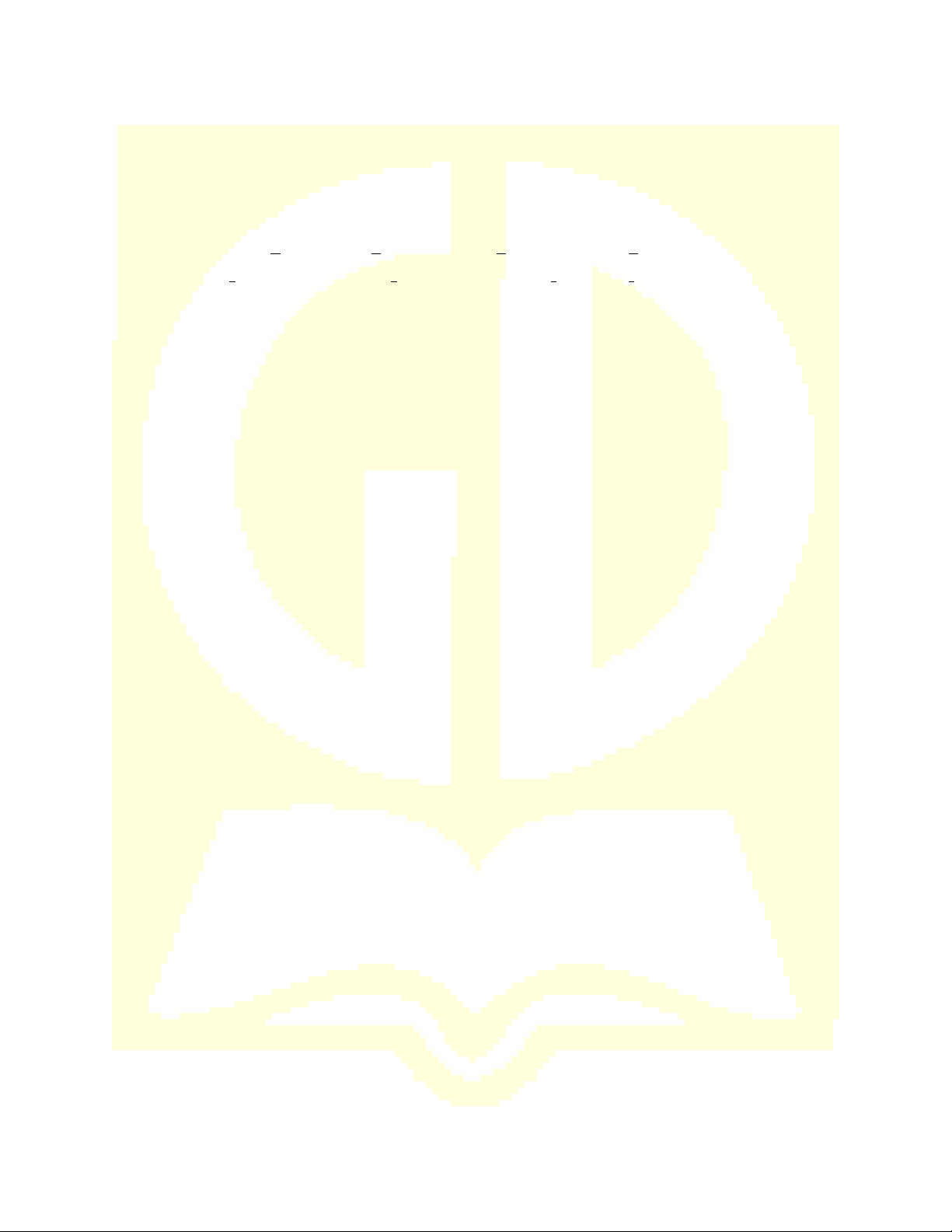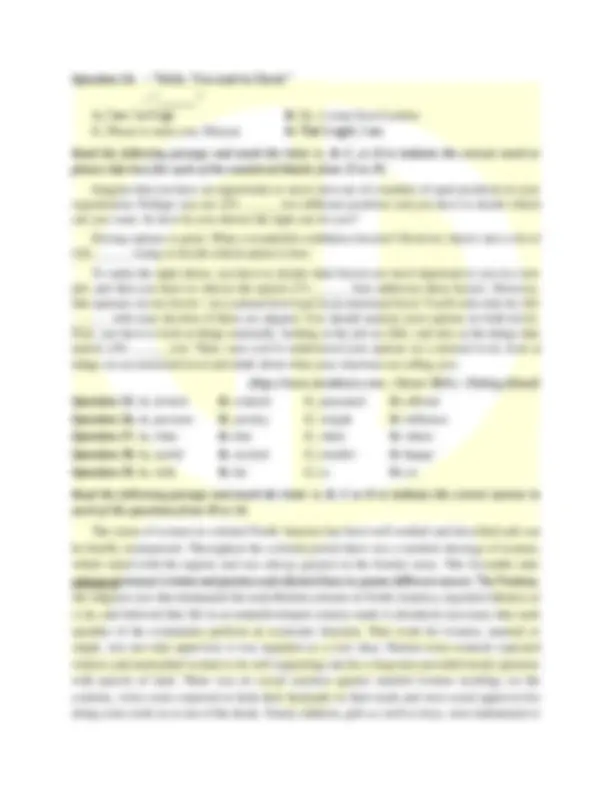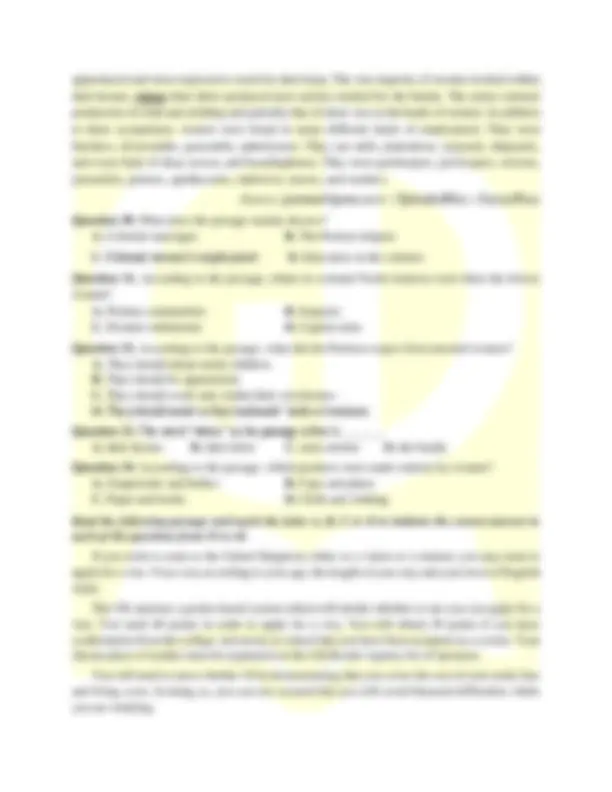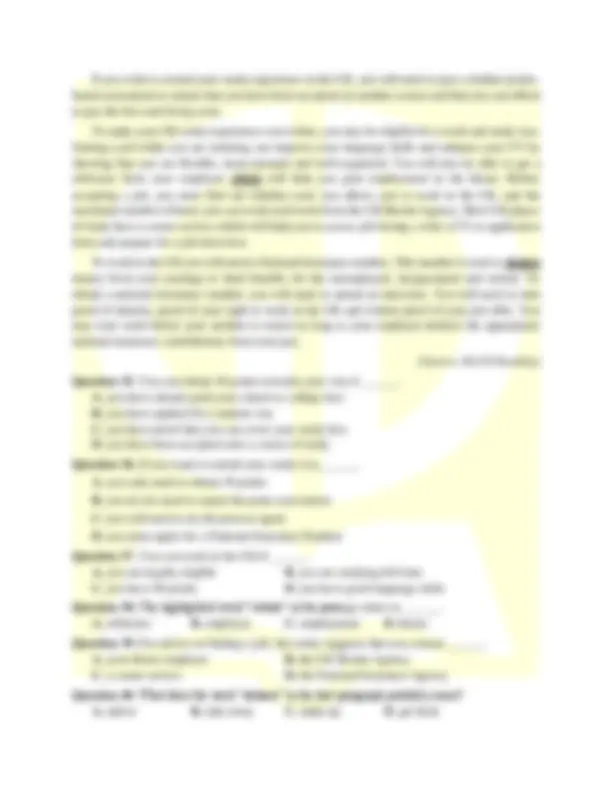





Study with the several resources on Docsity

Earn points by helping other students or get them with a premium plan


Prepare for your exams
Study with the several resources on Docsity

Earn points to download
Earn points by helping other students or get them with a premium plan
Community
Ask the community for help and clear up your study doubts
Discover the best universities in your country according to Docsity users
Free resources
Download our free guides on studying techniques, anxiety management strategies, and thesis advice from Docsity tutors
Đây cũng là bài ôn luyện TA lớp 9, không phải bài đh
Typology: Exercises
1 / 7

This page cannot be seen from the preview
Don't miss anything!




Time allotted: 60 min. Mark the letter A, B, C, or D to indicate the word whose underlined part differs from the other three in pronunciation in each of the following questions. Question 1. A. compulsory B. curriculum C. unnoticed D. upper Question 2. A. tsunami B. political C. intellectual D. temper Mark the letter A, B, C, or D to indicate the word that differs from the other three in the position of the primary stress in each of the following questions. Question 3. A. device B. petrol C. labour D. future Question 4. A. habitat B. sociable C. urbanise D. gorilla Mark the letter A, B, C or D to indicate the correct answer to each of the following questions. Question 5. He made a bad mistake at work, but his boss ______ him. He was lucky to be given a second chance. A. didn’t fine B. won’t fine C. wasn’t fining D. hadn’t fined Question 6. If I ______ to bed early, I could have got up in time and caught the train the next day. A. went B. would go C. was going D. had gone Question 7. My mother said I ______ walk until I was 3 years old. A. needn’t B. couldn't C. mustn’t D. mightn’t Question 8. It was ______ Tom’s carelessness that our keys were all lost. A. because B. except for C. since D. because of Question 9. I have read a book about Picasso, ______. A. a painter Spanish B. a Spanish painter C. who a Spanish painter is D. that is a Spanish painter Question 10. We have advised him ______ many times but, you know, he is a stubborn boy. A. of keeping quiet B. keeping quiet C. to keep quiet D. keeping quietly Question 11. I’m sorry to say that he is a very ______ man in the village. A. unlike B. impossible C. unpopular D. uninteresting Question 12. She didn’t __ doing the ironing, as she hadn’t wanted to go out anyway. A. object B. matter C. protest D. mind Question 13. Her guest apologized for causing her so much ______. A. problem B. complication C. trouble D. difficulty Question 14. Your motorbike is very ______. It hardly seems to use any petrol at all. A. economical B. economic C. economized D. economizing
Question 15. Since more than 50 percent of all marriages in the United States end in divorce, about half of the children in America must ____ in single-parent homes. A. grow up B. bring up C. come out D. go off Question 16. Beaches were ______ as police searched for canisters of toxic waste from the damaged ship. A. cut off B. sealed off C. washed up D. kept out Question 17. Don’t worry about your grandpa. Such problems are ______ universal feature of old age. A. a B. an C. the D. ø Question 18. Technology will continue to develop ______. A. although we could find ourselves facing serious problems B. despite the fact that we want it very much C. unless we enable our students to study it at school D. whether we think that is a good thing for our society or not Mark the letter A, B, C or D to indicate the word(s) CLOSEST in meaning to the underlined word(s) in each of the following questions. Question 19. He was caught shop-lifting but since this was his first offence he was allowed to go free with a warning. A. given way B. let down C. let off D. made off Question 20. Egyptians left no written accounts as to the execution of mummification, so the scientists had to examine mummies and establish their own theories. A. records B. traces C. substances D. essays Mark the letter A, B, C or D to indicate the word(s) OPPOSITE in meaning to the underlined word(s) in each of the following questions. Question 21. It is estimated that deficient insulation resulting in energy leaks increases the cost of heating the average home about 50 percent. A. good enough B. insufficient C. very costly D. cheap Question 22. Captain Henry, trying to avoid the enemy, crept breathlessly through the undergrowth. A. walked quietly and leisurely B. moved quickly and eagerly C. stood still excitedly D. crawled along patiently Mark the letter A, B, C or D to indicate the correct response to each of the following exchanges. Question 23. – “How can you get there?”
apprenticed and were expected to work for their keep. The vast majority of women worked within their homes, where their labor produced most articles needed for the family. The entire colonial production of cloth and clothing and partially that of shoes was in the hands of women. In addition to these occupations, women were found in many different kinds of employment. They were butchers, silversmiths, gunsmiths, upholsterers. They ran mills, plantations, tanyards, shipyards, and every kind of shop, tavern, and boardinghouse. They were gatekeepers, jail keepers, sextons, journalists, printers, apothecaries, midwives, nurses, and teachers. (Source: paramed.bpums.ac.ir › UploadedFiles › CourseFiles) Question 30. What does the passage mainly discuss? A. Colonial marriages B. The Puritan religion C. Colonial women’s employment D. Education in the colonies Question 31. According to the passage, where in colonial North America were there the fewest women? A. Puritan communities B. Seaports C. Frontier settlements D. Capital cities Question 32. According to the passage, what did the Puritans expect from married women? A. They should adopt needy children. B. They should be apprenticed. C. They should work only within their own homes. D. They should assist in their husbands’ trade or business. Question 33. The word “where” in the passage refers to ______. A. their homes B. their labor C. most articles D. the family Question 34. According to the passage, which products were made entirely by women? A. Gunpowder and bullets B. Cups and plates C. Paper and books D. Cloth and clothing Read the following passage and mark the letter A, B, C or D to indicate the correct answer to each of the questions from 35 to 42. If you wish to come to the United Kingdom, either as a visitor or a student, you may need to apply for a visa. Visas vary according to your age, the length of your stay and your level of English study. The UK operates a points-based system which will decide whether or not you can apply for a visa. You need 40 points in order to apply for a visa. You will obtain 30 points if you have confirmation from the college, university or school that you have been accepted on a course. Your chosen place of studies must be registered on the UK Border Agency list of sponsors. You will need to earn a further 10 by demonstrating that you cover the cost of your study fees and living costs. In doing so, you can rest assured that you will avoid financial difficulties while you are studying.
If you wish to extend your study experience in the UK, you will need to pass a further points- based assessment to ensure that you have been accepted on another course and that you can afford to pay the fees and living costs. To make your UK study experience even richer, you may be eligible for a work and study visa. Getting a job while you are studying can improve your language skills and enhance your CV by showing that you are flexible, team-oriented and well-organised. You will also be able to get a reference from your employer which will help you gain employment in the future. Before accepting a job, you must find out whether your visa allows you to work in the UK, and the maximum number of hours you can work each week from the UK Border Agency. Most UK places of study have a career service which will help you to access job listings, write a CV or application form and prepare for a job interview. To work in the UK you will need a National Insurance number. This number is used to deduct money from your earnings to fund benefits for the unemployed, incapacitated and retired. To obtain a national insurance number, you will need to attend an interview. You will need to take proof of identity, proof of your right to work in the UK and written proof of your job offer. You may start work before your number is issued as long as your employer deducts the appropriate national insurance contributions from your pay. (Source: IELTS Reading) Question 35. You can obtain 30 points towards your visa if ______. A. you have already paid your school or college fees B. you have applied for a student visa C. you have proof that you can cover your study fees D. you have been accepted onto a course of study Question 36. If you want to extend your study visa ______. A. you only need to obtain 30 points B. you do not need to repeat the point-assessment C. you will need to do the process again D. you must apply for a National Insurance Number Question 37. You can work in the UK if ______. A. you are legally eligible B. you are studying full time C. you have 40 points D. you have good language skills Question 38. The highlighted word “which” in the passage refers to ______. A. reference B. employer C. employment D. future Question 39. For advice on finding a job, the writer suggests that you contact ______. A. your future employer B. the UK Border Agency C. a career service D. the National Insurance Agency Question 40. What does the word “deduct” in the last paragraph probably mean? A. add to B. take away C. make up D. get back
Mark the letter A, B, C, or D to indicate the sentence that best combines each pair of sentences in the following questions. Question 49. Dad's car is very old. He can't afford to buy a new one. A. Dad's car is very old, but he can't afford to buy a new one. B. Dad's car is very old, so he can't afford to buy a new one. C. Dad can't afford to buy a new one just as his car is very old. D. Dad's car is very old, though he can't afford to buy a new one. Question 50. William Clark was not granted the rank of captain. Captain Lewis more or less ignored this and treated Clark as his equal in authority and rank. A. William Clark was not granted the rank of captain because Captain Lewis more or less ignored this and treated Clark as his equal in authority and rank. B. William Clark was not granted the rank of captain, thus Captain Lewis more or less ignored this and treated Clark as his equal in authority and rank. C. Although William Clark was not granted the rank of captain, Captain Lewis more or less ignored this and treated Clark as his equal in authority and rank. D. As William Clark was not granted the rank of captain, Captain Lewis more or less ignored this and treated Clark as his equal in authority and rank.